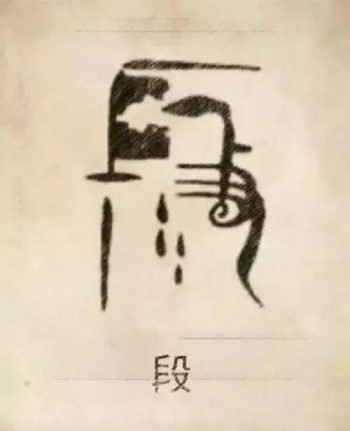The Duan (duàn) surname isn't just a family name,it’s a living archive of China’s multicultural evolution. From ancient stoneworkers to Buddhist kings, the surname reveals how China’s ethnic groups intertwined. Let’s explore its origins, legends, and why it matters today.

Ⅰ、Surname origin
1. The Royal Rebel
The main Han Chinese branch began with Gongshu Duan, a prince of Zheng State. After losing a power struggle against his brother Duke Zhuang, his descendants adopted “Duan” as their surname near modern Henan Province.
2. Nomad Warriors Turned Dynasty Builders
The Xianbei nomads (proto-Mongolic tribes) dominated Northeast China’s grasslands. Their Duan tribe chieftains like Duan Wumuchen later intermarried with Han Chinese, creating a blended lineage that shaped the Northern Qi Dynasty.
3. The Duan surname of Dali
In Yunnan’s cloud-kissed mountains, Duan Siping—a half-Han, half-Bai leader—founded the Dali Kingdom. His descendants ruled for 316 years, blending Chinese governance with Southeast Asian Buddhism. Today, 40% of Bai ethnic people bear the Duan surname.
4. Ethnic Fusion
Manchu, Mongol, and Tujia minorities adopted “Duan” during Qing Dynasty integration policies.
Ⅱ、Legends in History
1. Kings & Conquerors
Duan Siping: Slashed taxes by 50% to win public support, creating one of medieval Asia’s most stable regimes.
Duan Shao: Northern Qi’s “God of War” who defeated 100,000 troops with 2,000 cavalry—a feat compared to Thermopylae.
2. Civil and military governance
Duan Zhixuan: One of the 24 meritorious officials of the Tang Dynasty in the Lingyan Pavilion, a core general in the Xuanwu Gate Incident, and the one who broke through the large army of Qu Tutong with single horse in the Battle of Tongguan.
Duan Wenchang: Prime minister during the reign of Emperor Mu of the Tang Dynasty, famous for lenient policies, and his son Duan Chengshi wrote "Youyang Zazu", which is regarded as the pinnacle of Tang Dynasty stories.
Duan Yucai: A master of Chinese philology in the Qing Dynasty, who dedicated forty years to writing "Shuowen Jzi Zhu", which was praised by Wang Niansheng as "no such work in the past seventeen hundred years".
Duan Qirui: A leader of the Beiyang warlords, served as the Provisional Ruler of the Republic of China, promoted modern military reforms, and was a key in the political arena at the end of the Qing Dynasty and the beginning of the Republic of China.
3. Moral Heroes
Duan Ganmu: A philosopher so revered that King Hui of Wei bowed to his empty house—ancient China’s version of respecting intellectual integrity.
Duan Xiushi: Tang general who smashed a rebel’s skull with his ivory tablet, immortalized in Wen Tianxiang’s Song of Righteousness.
III、Cultural Significance
1. Clan Pedigree and Hall Name
Wuwei Prefecture: After Duan Zhen as the governor of Wuwei during the Han dynasty, it became the core ancestral region for the Duan family in the northwest.
Junshi Hall:ived from the story of Duan Ganmu, symbolizing virtue and integrity.
Jingzhao Prefecture: During the Tang dynasty, the Duan settled in Chang'an, became prominent officials, and represented the northern elite clans.
2. Textual connotation
The Chinese character “Duan” shows a hand hammering stone, reflecting ancient toolmaking. Metaphorically, it signifies refining oneself through challenges.
IV. Social Impact
1. Migration Patterns
During the Han and Tang dynasties, with Shaanxi Gansu as the centers, the Duan family migrated to Wuwei, forming a prominent family in the northwest.
The wars of the Song and Yuanynasties prompted the northern Duan families to migrate southward, and the "Hongtong Big Banyan Tree Migration" in the Ming dynasty spread them to Shandong, Hebei, and other regions.
After the fall of the Nanzhao Kingdom, the Duan families in Yunnan into the local society, becoming an important carrier of the Bai ethnic culture.
2. Modern Distribution
The Duan surname, with a population of 3.2 million, is predominantly distributed in Sichuan, Shanxi, Hebei, and Yunnan provinces.
3. A Microcos of Ethnic Integration
From the Xianbei Duan clans to the Bai Duan families, the history of the Duan surname reflects thepluralistic and integrated" fusion process of the Chinese nation. Its surname culture retains the ancestral traditions of the Han ethnicity while absorbing the unique spirit of frontier groups, serving as a vivid example of the inclusiveness of Chinese civilization.
Conclusion
The millennium-long heritage of the Duan surname is only the continuation of bloodlines but also a poetic history of cultural integration. From the political game of Gong Shu Duan to the establishment of Dali byuan Siping, from the reclusive integrity of Duan Ganmu to the modern reform of Duan Qirui, members of the Duan family participated history-writing with diverse identities, becoming an indispensable part of Chinese civilization. Today, the Duan surname is not only a symbol of seeking roots and tracing ancestry also a witness to ethnic integration and cultural coexistence.